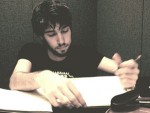Title
Forty percent of a New Juilliard Ensemble program has never before vanished in mid-season, but the April 3 concert, conceived with loving attention to internal balances of styles, recently developed a gaping hole. (Is anything about 2009 ordinary?) One piece had to be deferred because its composer, Juilliard alumnus Martin Matalon, was not free to come from Europe to supervise the recording session that was to follow the concert. Manuel Sosa’s new piece succumbed to computer death and could not be reconstructed in time. At the busiest point in the year, I suddenly had to prowl in my stash of scores and recordings to find the right substitutes.
Body
One piece was perfect, except that performing rights are still reserved for the ensemble that premiered it. Another fine work turned out to need multiple strings, which I generally avoid with N.J.E. Half-a-dozen scores by young Finnish composers, sent unsolicited by the Finnish Music Information Center, looked promising, but I know nothing about the composers, and while I frequently perform music that I have never heard, I normally can acquaint myself with other works by the same composer before deciding to program them. Now, however, time was at a premium. I asked for some feedback about them from several excellent Finnish composers and they all enthusiastically recommended the piece by Lotta Wennakoski. I was about to head home to continue the search-and-sort when I remembered that a parcel awaited me in the mailroom. It made my day: C.F. Peters had sent a recent score by the renowned Estonian Erkki-Sven Tuur. It turned out to be exactly the right length to fill the remaining slot, exactly the right instrumentation, and has exactly the right energy to restore the lost balance. Problem solved. On to others.
The reconfigured program includes a world premiere by Barret Anspach, a fourth-year undergraduate at Juilliard who is one of this year’s two winners of N.J.E.’s audition for composition majors. (The other was Jakub Ciupinski, whose Epyllion premiered in November.) Anspach calls it a “kind of” piano concerto (Euntaek Kim is the soloist). There will be three U.S. premieres: Wennakoski’s Nostalgiaim; Godspell, for soprano and chamber orchestra, by Stefano Gervasoni; and Tuur’s virtuosic Oxymoron, whose title refers to its combination of apparently contradictory compositional elements. Wennakoski’s Hungarian title—“My Nostalgias”—evokes the composer’s fond feelings about her year in Budapest studying violin. (It has nothing to do with the relationship between the Hungarian and Finnish languages, which is almost undetectable by anyone but linguists.) Gervasoni, who is one of Italy’s finest younger composers, has set texts by the New York poet Philip Levine (which Carin Gilfry, a Vocal Arts master’s student, will sing).
The only piece that has been done here is Bashrav, by the distinguished Israeli Betty Olivero. Her program note may tempt some readers to come hear it. “Bashrav is a suite form in Turkish and Arabic classical music,” Olivero writes. “The piece takes its inspiration from various traditional tunes originating in the Arab-Jewish musical heritage. I tried to draw an imaginative-poetic ‘sound-world’ of antique Arab string and percussion instruments. Some of these instruments are rather limited and therefore, to the Western ear, their musical material seems melodically and harmonically ‘primitive.’ However, I personally find it incredibly rich in color and expression …” The materials serve purely “as a dramatic stimulus and as a point of reference. These traditional melodies and texts undergo in the piece thorough transformation, so profound as to make their original form, at times, unrecognizable, yet their spirit and highly-charged dramatic potential remain untouched.”
I shall miss the lost pieces, but everything ended well. From the ruins of the original program has emerged a concert that should captivate performers and audience alike. Tune in next year for Matalon’s and Sosa’s compositions.





